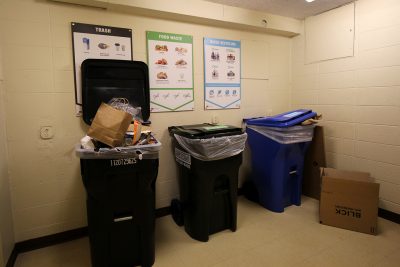
Boston University introduced a new three-bin recycling collection system in West Campus Residence Halls following petitioning by BU Sustainability and Student Government’s Environmental Affairs Department.
Trash, food waste and mixed recycling bins are now available on every floor that has a trash room in Claflin Hall, Rich Hall and Sleeper Hall. Previously, West Campus residences had recycling on only one floor of each building.
Increased recycling bins were originally implemented in Warren Towers in 2015. But, this access to recycling is an initiative of BU’s Climate Action Plan, and the University is working to achieve zero waste by 2030, according to Kaity Robbins, BU Sustainability zero waste manager.
Robbins wrote in an email the University has also switched from a dual-stream system that separates paper, bottles and cans to a single, mixed-recycling bin that collects all recyclables together in one container which is “easier for both residents and the University.”
Marissa Dalton, a freshman in the College of Arts and Sciences and a Rich Hall resident, said the newly implemented bins serve as encouragement to recycle more.
“All the recycling bins were on the first floor so it was not as easy to recycle, which made it a lot easier to just throw out the recycling,” Dalton said. “I think it’s a good idea because I think it will promote more actual recycling in the dorm.”
Dalton added she was seeing others on her floor begin using the recycling bins more frequently.
“I’m definitely seeing that there’s a lot less cardboard and boxes in the trash and sitting on the ground,” Dalton said. “They’re actually in the recycling bins.”
CAS sophomore Noah Jean-Baptiste said the recycling bins in Claflin Hall have motivated him to start recycling.
“I wasn’t doing any before, and now I’m doing a little bit,” Jean-Baptiste said. “So it’s definitely an improvement.”
StuGov Environmental Affairs Director Neha Chinwalla wrote in an email she has not heard of any official plans to add these bins to more dorms.
“I think if the West Campus program is successful,” Chinwalla wrote, “they will continue to expand.”
With recycling bins on each floor, Robbins wrote, it is now up to the students to carry out the sorting of materials properly, which is “essential to the success of the program.”
“BU Sustainability will be working with the Resident Sustainability Leaders to engage residents in waste sorting education programs,” Robbins added.
RSLs are members of BU Sustainability and Residence Life, who work to “promote a positive and healthy environment” for students, according to the BU Sustainability website.
The addition of recycling bins comes as a result of student requests for a more environmentally conscious campus at BU, Robbins wrote.
“We have heard from many students over the years that they want better and more access to recycling and food waste diversion,” Robbins noted. “We have heard them and agree that better access leads to more diversion. Now we need students to sort their materials properly.”
South Campus resident Rosa Kim, a sophomore in the School of Hospitality Administration, said she is hopeful that recycling bins can potentially be placed on the inside of her residence rather than the outside in the future.
“I’m not sure how effective having a recycling bin outside in our hallway would be just because I sit in my apartment all day,” Kim said. “But if it was inside the building, even just in the basement, maybe I would use it more often because I hate going outside.”
The next goal of BU Sustainability is to apply the initiative at 1019 Commonwealth Ave.
“Our ability to expand this initiative to more residences is contingent upon our confidence that residents can learn to properly sort their waste,” Robbins wrote. “We are asking for students’ help by taking time to educate yourselves and your peers on proper waste sorting habits.”






















































































































